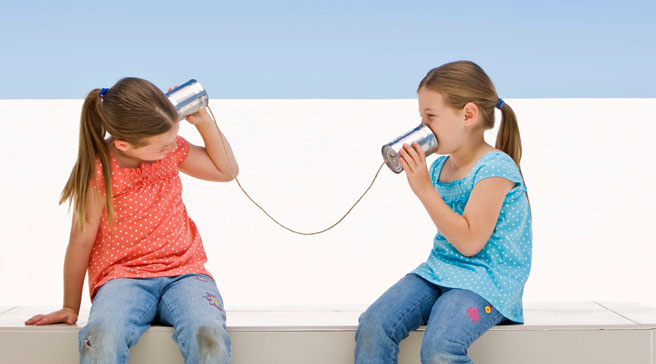The secret world of children’s friendships
They are the key to a happy and successful life, so learning how to make friends is a vital skill. Parents can help, but not in the way they think, says Viki Wilson

My four-year-old daughter was recently overheard in playgroup whispering intently with her best friend. They agreed to choose a moment later that day when, back at home, they would think of each other and whisper out loud that they loved each other.
It’s a funny, charming reminder of how intense childhood friendships can be from a very early age. We may no longer be in touch with our own childhood companions, but most of us can still remember the mounting sense of love and loyalty we experienced as those friendships grew. Looking back, making friends often seemed a natural, organic process.
But as we watch our children navigate the social jungle of early friendships, we’re reminded that perhaps that wasn’t necessarily the case. ‘Childhood friendship brings lifelong benefits,’ says Dr Cynthia Erdley of the University of Maine, co-author of The Role Of Friendship In Psychological Adjustment.
‘Our studies reveal that children who make just one close friend are far less likely to be lonely and depressed as adults, and are more likely to enjoy successful romantic relationships in later life,’ she says. Friendships help us learn about ourselves; we get more honest feedback than we do from family, says Dr Elizabeth Hartley Brewer, author of Making Sense Of Your Child’s Friendships. ‘This is especially important when children reach the age of seven or eight and undergo important cognitive changes, which result in them developing their own sense of identity separately from their families. Effectively they are thinking: This is who I think I am. Do you like me? Have I got me right?’
Early socialising
Modern life has wrought many changes on our children’s early social experiences. ‘Nowadays children have more opportunities to socialise in pre-school years, at nurseries, in day care, or because modern parents are aware of the importance of arranging play dates for their children,’ says Professor Judy Dunn, author of Children’s Friendships: The Beginnings Of Intimacy. Early socialising improves the chances of social success later in life.
But a surfeit of parenting advice can lead us to become over-involved in our children’s social lives partly, as Dunn points out, because of a tendency to exaggerate parental blame for a child’s difficulties with their peers. ‘The blame is out of balance with the actual evidence on how influential parents are in their child’s social life.’
Parents commonly view their children’s friendships through an adult lens, but child friendship is very much a learning game played on their terms, not ours. When we intervene, engineer or manage these relationships, we’re simply interfering, applying our own view of friendship onto theirs.
‘It’s important to achieve a delicate balance of encouraging your child without actually interfering too much,’ says Hartley Brewer. If we really want our children to have good friendships, we must stop trying to stage-manage and learn how they really work.
‘Many parents want their children to play with certain other children, perhaps those of their friends, or those who live locally,’ says psychologist Dr Thomas Berndt of the University of Purdue, Indiana. ‘But right from pre-school age, children instinctively bond with playmates who are equal to them in their eyes, and who share their interests. This is a fundamental characteristic of all friendships throughout life.’
The message to parents is clear – step back and allow young children to determine for themselves who their friends should be. There are some children, however, who find forging friendships more of a challenge. Children with lower self-esteem, who are shy, aggressive or clingy often struggle when it comes to forming early friendships. For these children the natural rules of friendship aren’t necessarily apparent. This is where you can help.
When to intervene ‘
Even in cases where a child is aggressive towards other children, parents can help enormously by making efforts to raise their child’s confidence at home, for example by praising them and asking their opinion,’ says Hartley Brewer. For shy children, give them some icebreakers: a line to say to other children or small toys to show when they play together. Finally it pays to be aware of how your own experiences of early friendships might affect your attitude as a parent.
Erdley found that mothers who were shy children tend to make a concerted effort to empower their children in friendships. ‘They provide lots of social opportunities and help their children if they are experiencing difficulties. Conversely, children whose parents were very socially confident tend to suffer because their parents tend to adopt the attitude of “I found it easy; my child will, too”.’
Alison’s son James, eight, is very shy. ‘I had tried to help by introducing him to other boys, which just seemed to make things worse. His most valuable friendship happened naturally, with no input from me at all. We were at a local park and I saw James playing intently with a puzzle. A new boy, Adam, was sitting down beside him watching him. Part of me wanted to go over and encourage James to make more effort but I resisted. Because Adam was genuinely interested in the puzzle, they started talking. Twenty minutes later they were playing on the climbing frame. Since making friends with Adam, the change in him has been remarkable. He laughs more easily and it’s all because this one boy has helped him to discover his own self-worth.’








